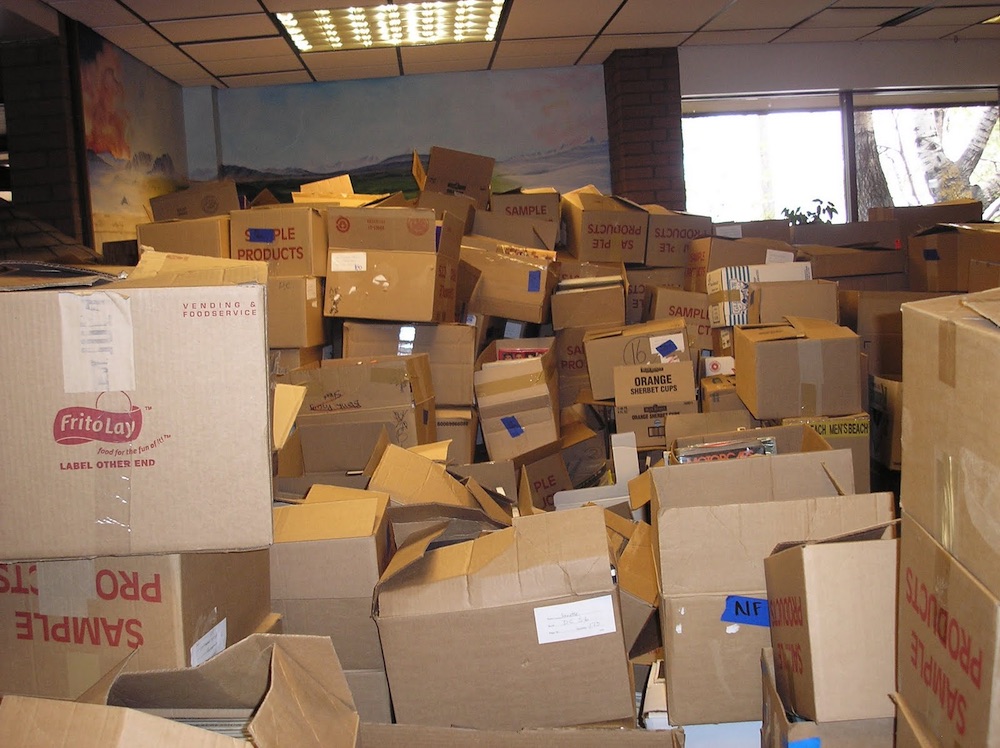When my apartment building’s water pipes burst during a recent deep freeze, our landlords gave us some bad news:
We had a week to move out of the place I’d lived in for almost five years.
But let me back up for just a second so I can put this all in perspective.
See, I write about how stories work; I don’t usually tell stories on this blog.
But this one is worth sharing, because if it saves you a few of the headaches I recently had, it’ll all be worth it for both of us.
Now then…
About a year ago, the building I’d lived in since 2013 was bought, along with a bunch of other properties, by some new landlords. The old owners wanted to retire, so they sold their entire inventory and got out of the business, leaving their tenants’ futures in the hands of a new company.
Our new landlords told us they intended to tear down our (admittedly dilapidated) apartment building and build new luxury apartments in its place. Honestly, it’s a wise business move.
All the other tenants in the building moved out pretty quickly after hearing this… except for me and my roommate.
Our rationale?
She was trying to save money so she could move to a whole new city, and I wasn’t sure if I wanted to stay in Baltimore for another year or not. So, rather than sign a new 12-month lease somewhere nearby, we figured we’d just ride out our current lease until we got the official notice that our building was coming down. (Also, shortly after that, I started a new relationship with a girl who also intended to move apartments, so I figured I’d let her make the first move and then I’d find something walkable in her new neighborhood.)
Thus, this winter, we became the only tenants in our building.
Which Brings Us to the Pipe Problem
With both of us mostly gone for the Christmas-to-New-Year’s break, there wasn’t much water flowing through the pipes during the week when Baltimore was hit by a long stretch of sub-frozen temperatures.
So you can imagine my roommate’s dread when she came home from vacation to found out that we had no hot water…. followed by our landlord stopping by to inform us that, yes, the building’s pipes had burst and there were several feet of freezing water accumulating in the basement.
“Since you’re the only tenants here,” they explained, “it doesn’t make any sense for us to repair it when this building’s just going to be demolished in a few months anyway. So, here’s what we’re gonna do instead.”
They offered us a different apartment a few blocks away that was juuuuuust big enough for me, her, and her dog to move into for a few months. And while that unit normally rents for a few hundred dollars more per month than she and I were paying, they also agreed to let us stay there for six months at our existing (lower) rent.
So, long story short: we had to move in a hurry… just so we can bide our time before we have to move again in a few months.
Delightful!
Now that I’ve mostly recovered from my Apartment Moving Speed Week, here are four useful tips I learned along the way.
My biggest advice?
Don’t just bookmark this page and wait until you also have to move in a hurry.
Many of these tips are things you can start doing now to make your next move far less stressful — regardless of whether it’s a long-planned relocation or a “drop everything and go” emergency.
4 Simple Tips for Making Your Next Move as Stress-Free as Possible
Let’s start with the most obvious tip, which we all know that we should be doing anyway but which we somehow never seem to find the time for:
Start Your Own Regular Downsizing Habit

Your new favorite sanity check.
I spent most of my moving-week time trying to solve two stupid problems:
- “Do I really need this?”
- “How am I going to move this from here to there?”
In most cases, the answer to question 1 was “no”… but a lot of that junk still came with me anyway.
Why?
Because, much like Pascal’s famous apology for not having the time to write a shorter letter, I didn’t have the time to edit my possessions down to a more manageable size; I just had to go.
What would have made this situation easier?
Set aside some time every week, month, or (at least) season to downsize the following:
- Your wardrobe
- Your books / magazines
- Your kitchen appliances and tools
- Your “junk closet” and/or “junk drawer”
(Seriously, after I moved, bags of books took up almost half of my total floor space.)
What can you do with clothes and homewares you decide you no longer need / want?
- Resell them on Craigslist, Facebook Marketplace, etc.
- Sell them at Plato’s Closet, Buffalo Exchange, or your regional thrift store
- Freecycle them (or, in Baltimore, TrashNothing)
- Donate them to Goodwill or these Goodwill alternatives
- Donate them to veterans groups like VVA or Purple Heart Pickup
- Garage / yard sale (team up with your neighbors to attract more attention)
- Leave them outside in a box marked FREE / GRATIS
As for your books, if you can’t resell them online or at your local independent bookstore, drop them off at your public library, a school library (if they’re age-appropriate), or in your neighborhood’s nearest Little Free Library.
(Not sure if you have one? Here’s a worldwide map of Little Free Library locations.)
Forget the Boxes; Stockpile Bags!

Your new best friends
Unless your boxes have handles or grips, you’re going to struggle.
Moving with boxes means you need to keep lifting them from their base, which increases your likelihood of pulling a muscle because you’re in a hurry or bending the wrong way. (Don’t ask me how I know this…)
It also means if you have to put them down, you need to leave space for your fingers to get underneath them again — which can be tough if you’re constantly putting boxes down on sidewalks, floors, etc. (Take it from a guy who once rested a refrigerator on his foot so he could adjust his grip: handles are your friends.)
So when I had to figure out how to move a hundred books in a hurry, by myself, I didn’t want to strain my back lifting dozens of overpacked boxes.
Instead, I moved even my heaviest items in a bunch of paper bags from Trader Joe’s and some reusable vinyl grocery bags (for the clunkier / sharper objects). This made the move much easier and saved me from trying to be a box-overfilling hero and pulling a muscle in the process.
I found that I could fill a double-bagged pair of paper bags almost to the top with books and still pick it up easily without the handles or bottom ripping. Plus, it makes moving all those bags around my new space much easier as I figure out where everything has to go.
Speaking of which…
Leave Walking Space Around Your Piles of Stuff

Stop doing this. You’re not a sherpa.
I know you just want to get your move done, but there’s one urge you need to resist:
Don’t just push your first batch of boxes or bags alllll the way against the wall in your new home.
Instead, leave a one-foot gap between your (temporary) junk pile and the wall, on all sides.
When you do this, you have easy access to all of your stuff as you’re unpacking, which means you can avoid two common problems:
- Marooning something important (like soap or toilet paper) in a box that’s buried under a mountain of junk
- Having to unpack in the order you unloaded your moving vehicle, rather than the order that makes the most sense for the space
And speaking of your moving vehicle…
For Heaven’s Sake, HIRE A MOVING COMPANY

Look how happy these guys are! WHY WOULD YOU DENY THEM THIS JOY?
Yeah… we didn’t hire professional movers this time, because we wanted to “save money.”
Translation?
My roommate and I each burned work days to box up all our crap and drive it to our new apartment in her car, which required multiple trips over multiple days, and left us exhausted pretty much from day one.
The alternative?
We could have paid about $600-$800 (estimated) for a service to send three guys to move our stuff for us, all in one day. (Plus, it would’ve cost even less if we’d boxed it all up ourselves.)
Using movers would have saved us time and our own physical wear and tear, and we’d have gotten back to work (and life) much faster.
So, yeah: always keep extra cash on hand for little emergencies like “hey, we suddenly need movers to transport all of our stuff from a rapidly flooding building.”
Because you just never know what Monday has up its sleeve, do you?
BONUS TIP
Okay, so maybe you still plan to do your emergency move all by yourself because “hiring movers is too expensive” or “I’m still young and unstoppable” or “it’s the principle of the thing” or whatever you’re telling yourself as you drag your eighteenth milk crate of magazines or longbox of Spider-Man #1 polybags up your three new flights of stairs.
Hey: you do you.
But if you’re going to fly solo, may I make two suggestions?

Yeah, sure, we can do it all in one trip
First, clean out your trunk. Because I know you have junk in there that you don’t need. Hell, you probably don’t even know what you have in there. (My girlfriend: “You didn’t happen to find a pair of boots in there, did you?” Me: “I found one.” Her: “Hmmmmm…”)
And second, make sure your car is properly maintained (and winterized).
Because you know what you don’t need at the end of a long week spent moving your entire life into a new apartment?
What you absolutely don’t need is to literally load your last batch of belongings into the car, sit down, turn the key… and find out your battery is dead… while you’re double-parked at a fire hydrant… during rush hour… as it starts raining.
Not that I’d know.
But yeah… like I said, maybe you should take this advice before you need it.
If You Liked This Post
… then you may also what I usually write about, like how to write more effectively for online audiences, or why every Pixar movie is basically the same.



0 Comments